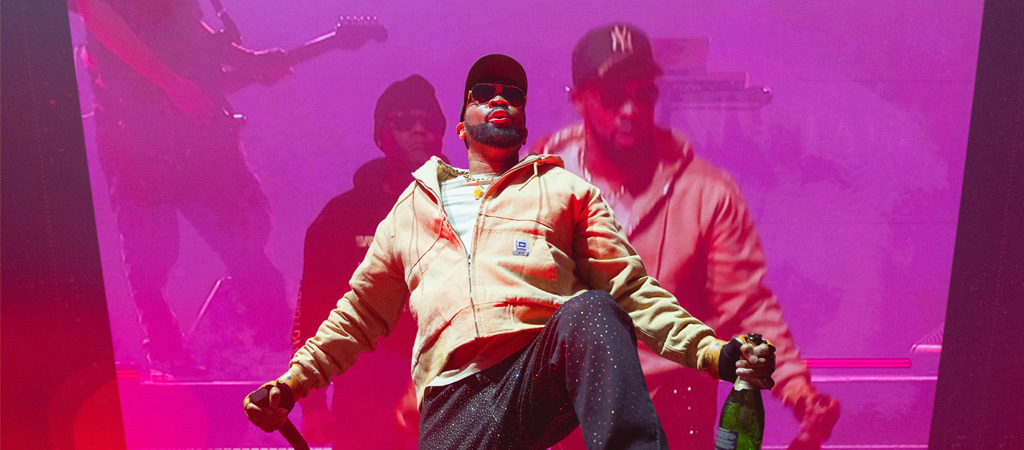Mon - Fri 8:00 - 6:30
Mon - Fri 8:00 - 6:30
 On HALO
On HALO
7 hours ago

There isn’t a single group more transformative to hip-hop than the Wu-Tang Clan. They redefined what hip hop could be, forever changing and morphing rap music into their image, inspiring multiple generations of artists and even reaching beyond music. Simply put, we struggle to imagine what hip hop — with all its disparate sub-genres and larger than life personalities — would look, sound, and be like without the impact of the Wu-Tang. So when it was first announced that this year’s tour would be the group’s farewell, it hit every hip hop fan in the heart.
Who better to speak to that than legendary hip hop journalist Elliott Wilson, who has been covering hip hop for more than 30 years and met RZA before he was a household name? We chopped it up with Elliott about the early days of the group, what they brought to the game, what the end of Wu-Tang means for rap music, and why getting to NYC and catching them on this farewell tour is absolutely vital this summer.
Can you speak to the cultural importance of Wu-Tang? What’s their biggest contribution to the culture?
Well, I think they just came in as an independent force and from an area of New York City that was not connected to hip-hop, Staten Island. It was such an anomaly. A crew of rappers who were all very skilled, and came out of nowhere, unified, and brought this energy to the game. I heard about them independently when they first put ‘Protect Ya Neck’ out. I met their manager, Mike McDonald, and it was clear that they had built an underground movement. It was unique to have all these super talented rappers with an uncompromising sound in one group.
And then, they’re not only going to do a record deal for themselves as a group, but each individual member is going to sign their own record deal. Method Man signed his deal with Def Jam, Ol’ Dirty Bastard signed his deal with Elektra, Raekwon signed to Loud, which also put the group album out. The idea that there was this all-star crew of talent coming out of this forgotten area of New York City and the unification of how they carried themselves. It felt new and I think it brought a lot of excitement to the game because it was something different we hadn’t seen before.
Take us into the moment when you first heard ‘Protect Ya Neck.’ What were your early impressions?
Raw and uncompromising. The mission was so focused. RZA had convinced them all that this is a posse cut, everybody gets their little six to eight bars on it. The presentation and the connection I felt from jump was that those dudes were mad charismatic. I remember meeting RZA and GZA, they had previous experience in the business but when they put music out, it wasn’t reflective of their actual image. So when they got Wu-tang Clan together, they were very much adamant about being uncompromising — it showed them as they really live and move around.
The main thing though is they put that single out and then the album came out and there was a little bit of pushback. It was such a different sound at the time, but really it’s when the record ‘C.R.E.A.M.’ took off, that was the awakening that brought Wu-Tang to the mainstream.
There was no denying them after that, it catapulted them from the local New York scene to mainstream nationwide. And eventually worldwide.
Wu-Tang is used as shorthand to describe the New York sound the same way that G-Funk is used to describe the West Coast. Being that they came out of Staten Island, did it still feel distinctively New York at the time, or did they move the conversation to revolve around them?
At the time, when we thought of New York hip-hop, we thought of the boom bap sound. Heavy drums and it’s on the one in the two. But I think RZA didn’t mind it being a little off-kilter or a little more muddy. You know what I mean? Think there was some criticism over that. I remember when the debut album came out, some people didn’t really connect with the production the same way and felt it wasn’t as traditional as the boom bap New York sound.
So I think I look at RZA’s sound as a spin on that traditional New York hip-hop. The way he put loops and samples was unconventional compared to someone like DJ Premier or Pete Rock. RZA’s approach was so different it took people a minute to really grasp it.
It was a very New York sound, but I think RZA’s approach was distinctively different. Until ‘C.R.E.A.M.’ took off, and then Wu-Tang really became a movement.
Do you remember the first time you saw Wu-Tang? How did people talk about the group?
It was the New Year’s Eve show in New York in ’93. It was always chaos because people thought, “Well, who’s exactly in Wu-Tang?” There was a mystique around it.
People kind of knew Method Man and certain key members, but outside of that, people didn’t fully grasp who the members were.
How has the live experience of seeing Wu-Tang evolved throughout the years?
They’ve admitted that one of the biggest mistakes they made was when Wu-Tang Forever came out in ’97, they went on this huge tour with Rage Against the Machine. They didn’t like it because it was designed to take them more mainstream. They were hitting audiences that were rock fans, and they wanted to be in the hip-hop scene and didn’t want the grueling tour schedule that came with rock at the time. So they eventually quit the tour and I think they got replaced by The Roots. I don’t think they took the live show seriously.
Now, they’re going on their final tour, and I feel like they take that seriously and see value in that, and see the importance of touring and want to reach their audience. At first, I don’t know how connected they were to it.
Now, they get it. They understand the value of tour. Their live shows have gotten better. This new tour, RZA’s adamant that all the members are going to show up. It’s more unified now and they’re going to define their legacy properly.
As a person who has lived and breathed hip-hop for their entire career, can you take us into what was different about hip-hop before and after Wu-Tang? Without Wu-Tang, do we have people like MF Doom? And without MF Doom, where would the underground even be?
Yeah, I think that’s probably it. This sort of uncompromising underground culture. Even though ‘C.R.E.A.M.’ took off, I don’t think they felt it was a radio single. It was raw and authentic. Wu-Tang brought a culture. It goes beyond the music itself. That symbol to this day means something to people.
The unique thing about them was they were not only giving you great music, but also the branding, the organic marketing, everything about them was ahead of its time. When you wear a Wu-Tang shirt it doesn’t just feel like some promo t-shirt, it feels like you’re a part of something, you’re a part of a movement, you’re part of a culture.
They’re all brilliant writers. So the culture of that, the words, I think what stood out from the jump, why people felt like that logo means something.
I remember I was at The Source and we were going to do a Wu-Tang Clan cover, and unfortunately, the publisher tried to say, “All the members have to agree to the photo.” They would come up to the office, and Raekwon wouldn’t like this photo, Method Man would like the photo, so we couldn’t make a final decision. Ultimately, we just put the Wu-Tang logo on the cover and it was a huge seller. We didn’t even need an image of them to sell it. It speaks to me that they brought not just music to the game, but they brought a whole identity and culture, which really was unique at that time. That underground, uncompromising tendency it continues to inspire the generations that have come after.
A lot of hip-hop groups say they’re retiring, and let’s face it, no one really retires anymore, but Wu-Tang actually might. So why should people see Wu-Tang before it’s too late?
The deals have been done, they’re secure — you’re getting all the members this time. Think about how tough it is to get every member on the same page. If you’re a fan of one individual in the group, you’re going to get your moment with your hero. I think when they say they’re retiring, they’re really saying that “we can’t guarantee that this will ever happen this exact way ever again.”
You’ll always get some form of the Wu-Tang, but this is the one to catch because you’re going to get everybody committed, probably for the first time fully committed! This is the last time RZA will be able to guarantee that he can deliver every member at their full potential. You’re going to get your Method Man moment, you’re going to get your Ghostface Killah moment, you’re going to get a Raekwon moment. Every night.
What do you think Wu-Tang’s end means for hip hop on the whole?
They still represent the standard of excellence. Every artist wants to be successful, but at the end of the day, if you’re going to make a true impact, you’re going to have to empower others and Wu-Tang represents brotherhood, it represents empowerment, it represents impact. And I think that that’s something people continue to be as inspired by. It’s almost like a sports mentality. You want to play with your guys, and you want to win the championship, but it takes a team to do that.
Wu-Tang is the ultimate team for hip hop. One person can’t do it alone; you have to find people unified in what your mission is, set your goals, and achieve it. Wu-Tang is an embodiment of that, and that’s why their impact moves beyond hip hop. That measure of brotherhood and teamwork and dedication and unification, that’s what we all aspire to achieve, to win, to unify, to create, to reach a certain goal. I think that Wu-Tang embodies that.